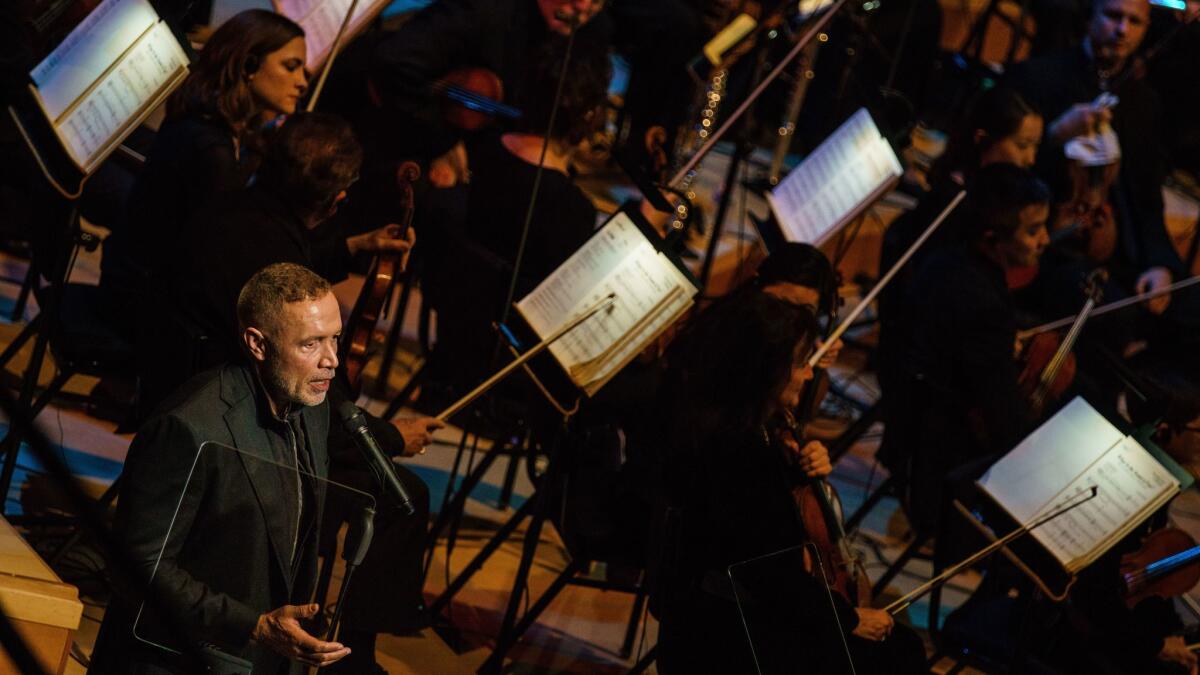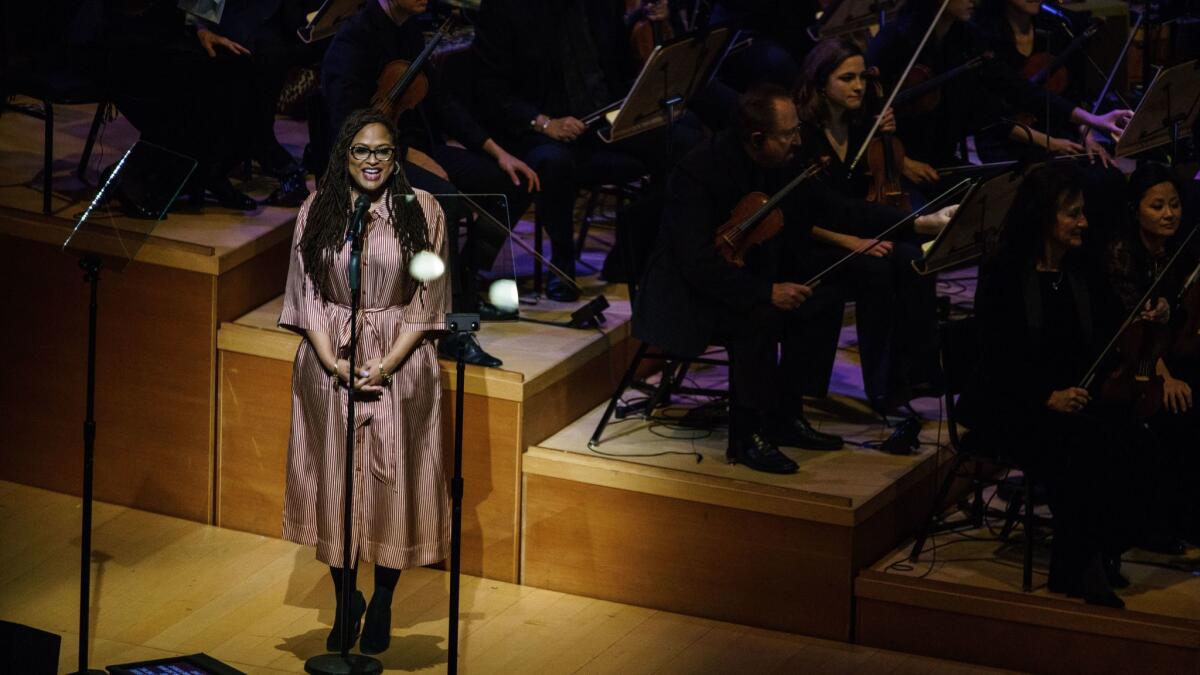From ‘Three Billboards’ to ‘Last Jedi,’ movie music gets the Disney Hall spotlight

- Share via
Do classical music people still look down on music composed for film? It was a question considered by Laura Karpman, an Emmy-winning composer and one of the curators of “The Oscar Concert” on Wednesday night at Walt Disney Concert Hall.
“It’s an old way of thinking,” Karpman said before the concert, which she curated with Michael Giacchino, the Oscar-winning composer of “Up,” and Emmy-winning composer Charles Bernstein. “It’s not what’s happening now. There’s this constant interaction with classical music — an intersection of new music, world, concert and film music.”
Three of this year’s five Oscar-nominated composers were on hand to lead the Los Angeles Philharmonic in excerpts of their scores: Carter Burwell for “Three Billboards Outside Ebbing, Missouri,” Alexandre Desplat for “The Shape of Water” and John Williams for “Star Wars: The Last Jedi.”
Thomas Wilkins conducted the other two nominees: Jonny Greenwood’s music for “Phantom Thread,” introduced by the film’s director, Paul Thomas Anderson (who said onstage that he asked his composer to “write some music like Nelson Riddle’s”); and Hans Zimmer’s score for “Dunkirk,” during which Zimmer played keyboards.
“The music for the film couldn’t be jubilant or sentimental,” Zimmer said before the concert. “The spirit of ‘Dunkirk’ is one reason why I’m here. My mother was a European refugee — so the music for the film had to come from a different place. It’s not the happiest piece you’ll hear tonight.”
But happy isn’t always the point, composers said during a pre-concert conversation backstage. A good score, Giacchino said, ideally provides a soul for a film.
“It’s a direct representation of emotion, but you have to be very careful. It’s easy to ruin a film,” said Giacchino, whose favorite scores include Max Steiner’s music for the 1933 “King Kong.”
“He showed us the way, using leitmotifs — themes attached to characters,” Bernstein added. “We all come from the School of Steiner. That’s where we learned our craft.”

Once the concert got underway, celebrities including actresses Daniela Vega and Michelle Rodriguez and director Ava DuVernay introduced music passages grouped in categories such as “The Sound of Love,” “The Sound of the Chase” and “The Sound of Courage.”
“Courage” included Alex North’s clashing, martial music for “Spartacus.” There was a striking continuity between North’s score and Zimmer’s largely abstract, electronic one played later in the program. Similarly, Desplat’s lushly romantic music for “The Shape of Water” seemed a not-so-distant, French-accented relation to Erich Wolfgang Korngold’s richly melodic “The Adventures of Robin Hood.”
The concert juxtaposed movie music with film clips, so while the orchestra performed “Spartacus,” images from “Milk” and “Gandhi” flashed on screen as examples of courage. In “The Sound of the Chase,” the L.A. Phil’s account of Lalo Schifrin’s propulsive, brassy music tailored to the car sequence in “Bullitt” played with a jumble of snippets from other films including “The French Connection,” “Drive” and “The Road Warrior.”
More in sync were short excerpts from Quincy Jones’ edgy, modernist jazz score for “In Cold Blood” and Mica Levi’s disorienting, moody work in “Jackie” — both selections from “The Sound of Fear” portion of the program, introduced by “Get Out” composer Michael Abels.
Guillermo del Toro, the favorite to win best director for “The Shape of Water” on Sunday, introduced himself by quipping: “Good evening, I’m Michael Moore,” a reference to the similarly portly but perhaps better known director.
Also on hand was A.R. Rahman, who won the original score and song Oscars in 2009 for “Slumdog Millionaire.” Rahman introduced “The Sound of Home.”
“I grew up with ‘The Sound of Music,’” Rahman said earlier backstage, talking about the universality of film music. “I lived in a remote town in South India. Our teacher played ‘Do-Re-Mi’ on the piano. These days everything is just a Google search away.”
Some of the loudest audience response was reserved for John Williams, who conducted “The Rebellion Is Reborn” section from his Oscar-contending “Last Jedi” score — his 51st nomination.
See all of our latest arts news and reviews at latimes.com/arts.
UPDATES:
2:30 p.m.: This article was updated to clarify that Paul Thomas Anderson’s comment about Nelson Riddle was made onstage, not backstage.
11:25 a.m.: An earlier version of this story omitted Laura Karpman’s credits as an Emmy-winning composer.
This article was originally published at 2:40 p.m. March 1.
More to Read
The biggest entertainment stories
Get our big stories about Hollywood, film, television, music, arts, culture and more right in your inbox as soon as they publish.
You may occasionally receive promotional content from the Los Angeles Times.









